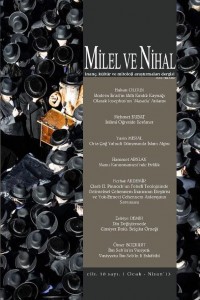Abstract
In the history of Islamic thought, a great number of philosophers had testaments (al-wasiyya). These philosophers‟ testaments are mostly not juridical. Rather, these testaments are significant works on the grounds that they contain the essence of philosophers‟ thoughts and their major advices. The same condition goes with Ibn Sab‟in‟s tractate titled Wasiyyatu Ibn Sab‟in li ashâbihî. In this study, first of all, we will evaluate Ibn Sab‟in‟s “wasiyya” according to its form, language, style, method and content. Next, we will include Turkish translation of this “wasiyya” and its original text in our study.
References
- Bardakçı, Mehmet Necmettin, ‚Abdülhak İbn Seb‘în ve Tasavvufî Düşünceleri‛, İSTEM, y.7, sy.14, 2009, ss.121-144.
- Bozkurt (Gülmez), Birgül, İbn Seb‘în Hayatı Eserleri ve Felsefi Görüşleri, Yayımlanmamış Doktora Tezi, AÜSBE, Ankara, 2008. , ‚İbn Seb‘în’in Hayatı İlmi Kişiliği ve Eserleri‛, CÜİF Dergisi, XII/2, 2008, 347-380. , ‚Endülüslü Filozof Sûfî İbn Seb‘în’e Göre Hakikati Arayanlar‛, İSTEM, y.7, sy.14, 2009, ss.283-309
- Bozkurt, Ömer, ‚İbn Seb‘în ve Hakkında Yapılan Çalışmalar‛, İSTEM, y.7, sy.14, 2009, ss.191-206. el-İdrîsî, Muhammed el-Adlûnî, Felsefetu’l-vahdeti fi tasavvufi İbn Seb‘în, Dâru’s-Sakâfe, 1998.
- Gazâlî, el-Munkız mine’d-dalâl, Çev. Y. Pakiş, Umran Yay., İstanbul, 1998. , İhyau ulûmi’d-din, Çev. Ahmet Serdaroğlu, Bedir Yay., İstanbul, 19 , Gazâlî’nin Vasiyeti, (Gazâlî’nin Kitâbu’l-İmlâ fi işkâlâti’l-İhyâ eseri içerisinde), İslam Filozoflarından Felsefe Metinleri, Çev. Mahmut Kaya, Klasik Yay., İstanbul, 2003, s.409-412.
- İbn Miskeveyh, İbn Miskeveyh’in Vasiyeti, (Ebu Hayyan et-Tevhidî’nin elMukâbesât eserinin içersinde), İslam Filozoflarından Felsefe Metinleri, Çev. Mahmut Kaya, Klasik Yay., İstanbul, 2003, s.269-271.
- İbn Seb‘în, Resailu İbn Seb‘în, Tahkik: Abdurrahman Bedevî, Daru’l Mısriyye, Kahire, 1956. , Vasiyyetu İbn Seb‘în li eshâbihî, Resailu İbn Seb‘în. , Risaletu’l-Kavsiyye li İbn Seb‘în, Resailu İbn Seb‘în. , Kitabu’l-İhâta, Resailu İbn Seb‘în. , Ahd İbn Seb‘în li telâmizihî, Resailu İbn Seb‘în.
- İbn Sina, el-İşârât ve’t-tenbihât, Çev. A. Durusoy, M. Macit, E. Demirli, Litera Yay., İstanbul, 2005.
- İbnu’l-Arabî, Muhyiddin, Kitabu’l-Vasâyâ Futuhât Deryasından Vasiyetler-1, Çev. Abdullah Tâhâ Feraizoğlu, Kitsan Yay., İstanbul, 1999. , Futûhâtu’l-Mekkiyye, Mısır, 1854, c.4, ss.492-611.
- Kütübî, Fevâtu’l-Vefeyât, Matbaatu’s-Saade, Mısır, trs. Râzî, Fahrettin, ‚Fahrettin Râzî’nin Vasiyeti‛, (Haz. ve Çev. M. Cüneyt Kaya) Bilim ve Sanat Vakfı Bülten, y.16, sy. 56, (Eylül-Aralık 2005) ss.65-66.
- Sühreverdî, Şihabuddin, İşrâk Felsefesi Hikmetu’l-İşrâk, Çev. Tahir Uluç, İz Yay., İstanbul, 2012, ss.221-222.
- Şeref, Muhammed Yasir, Felsefetu’l-vahdeti’l-mutlaka inde İbn Seb‘în, Daru’rReşid, Irak, 1981
- Taftazânî, Ebu’l-Vefâ, İbn Seb‘în ve felsefetuhu’s-sûfiyye, Daru’l-Kitabi’lLübnani, Beyrut, 1973. , Ebu’l-Vefâ & Leman, Oliver, ‚İbn Seb‘în‛, İslam’da Bilgi ve Felsefe Kindi’den İkbal’e İslam Düşünürleri, (Haz. Mustafa Armağan), Şule Yay., İstanbul, 1999.
Abstract
İslam düşünce tarihinde birçok filozofa ait vasiyetler bulunmaktadır. Filozofların bu vasiyetleri, büyük çoğunlukla fıkhî nitelikte vasiyetler değildir. Bunlar genelde filozofların düşüncelerinin özünü ve en temel tavsiyelerini içermesi açısından dikkate değer eserlerdir. Aynı durum, İbn Seb‘în’in Vasiyyetu İbn Seb‘în li eshâbihî adlı risalesi için de geçerlidir. Bu çalışmada öncelikle İbn Seb‘în’in Vasiyyetu İbn Seb‘în li eshâbihî adlı vasiyetini, şekilsel açıdan, dil, üslup, metot ve içerik bakımlarından değerlendireceğiz. Daha sonra bu risalenin çevirisini Arapça metniyle birlikte çalışmamıza ilave edeceğiz.
References
- Bardakçı, Mehmet Necmettin, ‚Abdülhak İbn Seb‘în ve Tasavvufî Düşünceleri‛, İSTEM, y.7, sy.14, 2009, ss.121-144.
- Bozkurt (Gülmez), Birgül, İbn Seb‘în Hayatı Eserleri ve Felsefi Görüşleri, Yayımlanmamış Doktora Tezi, AÜSBE, Ankara, 2008. , ‚İbn Seb‘în’in Hayatı İlmi Kişiliği ve Eserleri‛, CÜİF Dergisi, XII/2, 2008, 347-380. , ‚Endülüslü Filozof Sûfî İbn Seb‘în’e Göre Hakikati Arayanlar‛, İSTEM, y.7, sy.14, 2009, ss.283-309
- Bozkurt, Ömer, ‚İbn Seb‘în ve Hakkında Yapılan Çalışmalar‛, İSTEM, y.7, sy.14, 2009, ss.191-206. el-İdrîsî, Muhammed el-Adlûnî, Felsefetu’l-vahdeti fi tasavvufi İbn Seb‘în, Dâru’s-Sakâfe, 1998.
- Gazâlî, el-Munkız mine’d-dalâl, Çev. Y. Pakiş, Umran Yay., İstanbul, 1998. , İhyau ulûmi’d-din, Çev. Ahmet Serdaroğlu, Bedir Yay., İstanbul, 19 , Gazâlî’nin Vasiyeti, (Gazâlî’nin Kitâbu’l-İmlâ fi işkâlâti’l-İhyâ eseri içerisinde), İslam Filozoflarından Felsefe Metinleri, Çev. Mahmut Kaya, Klasik Yay., İstanbul, 2003, s.409-412.
- İbn Miskeveyh, İbn Miskeveyh’in Vasiyeti, (Ebu Hayyan et-Tevhidî’nin elMukâbesât eserinin içersinde), İslam Filozoflarından Felsefe Metinleri, Çev. Mahmut Kaya, Klasik Yay., İstanbul, 2003, s.269-271.
- İbn Seb‘în, Resailu İbn Seb‘în, Tahkik: Abdurrahman Bedevî, Daru’l Mısriyye, Kahire, 1956. , Vasiyyetu İbn Seb‘în li eshâbihî, Resailu İbn Seb‘în. , Risaletu’l-Kavsiyye li İbn Seb‘în, Resailu İbn Seb‘în. , Kitabu’l-İhâta, Resailu İbn Seb‘în. , Ahd İbn Seb‘în li telâmizihî, Resailu İbn Seb‘în.
- İbn Sina, el-İşârât ve’t-tenbihât, Çev. A. Durusoy, M. Macit, E. Demirli, Litera Yay., İstanbul, 2005.
- İbnu’l-Arabî, Muhyiddin, Kitabu’l-Vasâyâ Futuhât Deryasından Vasiyetler-1, Çev. Abdullah Tâhâ Feraizoğlu, Kitsan Yay., İstanbul, 1999. , Futûhâtu’l-Mekkiyye, Mısır, 1854, c.4, ss.492-611.
- Kütübî, Fevâtu’l-Vefeyât, Matbaatu’s-Saade, Mısır, trs. Râzî, Fahrettin, ‚Fahrettin Râzî’nin Vasiyeti‛, (Haz. ve Çev. M. Cüneyt Kaya) Bilim ve Sanat Vakfı Bülten, y.16, sy. 56, (Eylül-Aralık 2005) ss.65-66.
- Sühreverdî, Şihabuddin, İşrâk Felsefesi Hikmetu’l-İşrâk, Çev. Tahir Uluç, İz Yay., İstanbul, 2012, ss.221-222.
- Şeref, Muhammed Yasir, Felsefetu’l-vahdeti’l-mutlaka inde İbn Seb‘în, Daru’rReşid, Irak, 1981
- Taftazânî, Ebu’l-Vefâ, İbn Seb‘în ve felsefetuhu’s-sûfiyye, Daru’l-Kitabi’lLübnani, Beyrut, 1973. , Ebu’l-Vefâ & Leman, Oliver, ‚İbn Seb‘în‛, İslam’da Bilgi ve Felsefe Kindi’den İkbal’e İslam Düşünürleri, (Haz. Mustafa Armağan), Şule Yay., İstanbul, 1999.
Details
| Primary Language | Turkish |
|---|---|
| Journal Section | Articles |
| Authors | |
| Publication Date | November 11, 2014 |
| Submission Date | November 11, 2014 |
| Published in Issue | Year 2013 Volume: 10 Issue: 1 |


